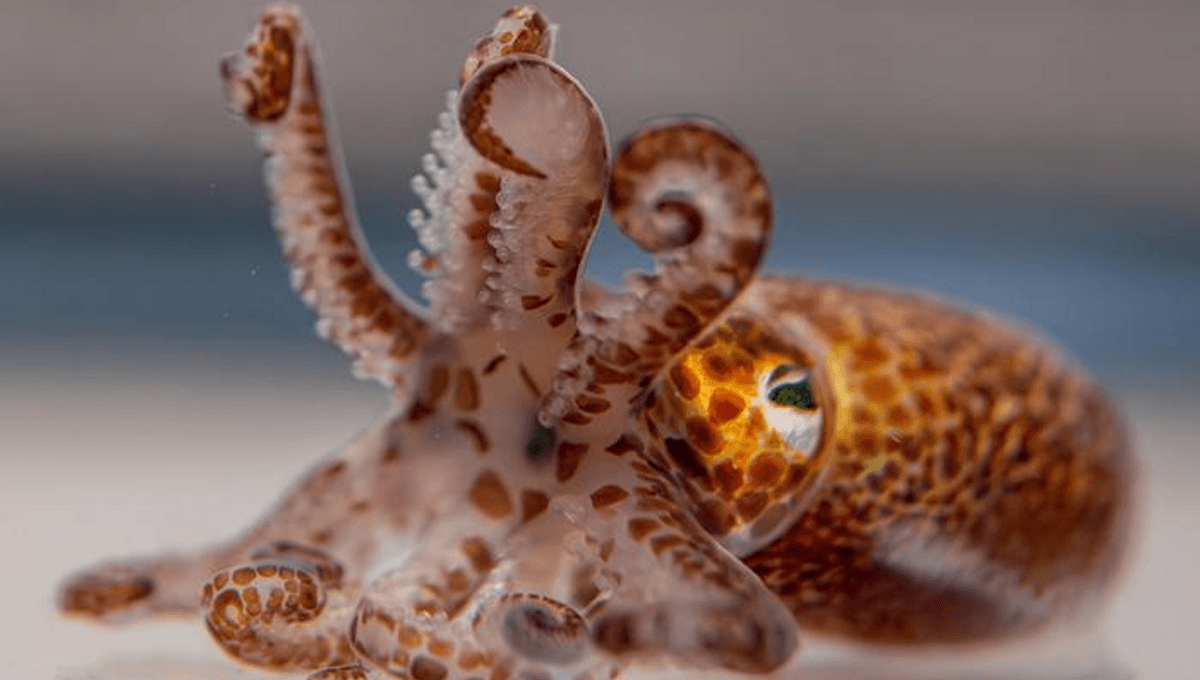
Hawaiian bobtail squid (Euprymna scolopes) are known for their bioluminescent glow, which is thought to be used to camouflage them as they attack from the direction of the Sun. Unlike fireflies or jellyfish, however, the squid do not produce the light themselves, instead having outsourced luminescence to bacteria that make a home in a specialized light organ the squid have evolved beneath their mantle.
The squid are not born with the bacteria however, and the process of how colonization takes place turns out to be a remarkable one, now revealed for the first time. Although so far only demonstrated in one bacterial species, the authors of the study revealing the process think it represents a much more widespread behavior among single-celled organisms forced to conduct complex operations without a brain.
“The bacteria we study, known as Vibrio fischeri, is associated with many different marine hosts, but its association with Hawaiian bobtail squid is the best characterized,” said team leader Dr Tim Miyashiro of Penn State in a statement.
We don’t really understand what a lot of bioluminescent organisms get out of spending so much energy to produce their beautiful glows, but for V. fischeri the benefits are as obvious as their light. The squid provide the bacteria with nutrients, as well as a relatively safe haven that can evade predators better than a free-floating bacterium can.
What has been more mysterious is how the symbiotic relationship is engaged. It takes a lot of bacteria to produce a useful glow – until then, producing light is just wasting energy. Consequently, V. fischeri use a process known as quorum sensing, where behavior changes once a certain density has been achieved.
Quorum sensing is a common technique among microscopic organisms, used to modify production of defensive chemicals and is also used by our own immune cells. However, there are extra challenges in this case. V. fischeri form aggregates outside the squid prior to colonization. But emitting light in the open ocean without the nutrients provided by squid is wasteful at best, and might attract the wrong sort of attention.
“So, the question is ‘how do the bacteria avoid the quorum sensing pathway when they form these large aggregates outside of the squid and instead initiate behavior that promotes colonization?'” said Miyashiro. “What we saw was that the aggregation pathway activates the production of a small RNA molecule that is normally repressed by quorum sensing. Therefore, when the signaling pathway that leads to aggregation is activated outside the squid, the RNA molecule is expressed, which enables the cells to bypass quorum sensing to remain motile and dark.”
The relevant piece of RNA is known as Qrr1. When safely in the squid’s light organ, Qrr1 gets shut down and when quorum sensing reveals the time is right, the bacteria start to glow. Outside, however, the authors discovered that transcription factors LuxO and SypG keep Qrr1 operating so the bioluminescence doesn’t turn on. The factors operate “similar to an OR logic gate,” the authors write, to keep Qrr1 working when stealth mode is required.
“When we look across the bacterial family that includes V. fischeri, we see very similar structures that suggest to us that this type of coordination is likely to be important for many symbiotic bacteria,” Miyashiro said.
Of course, not all the bacteria that colonize animals are symbiotic. Pathological bacteria, such as those that sometimes take control of the human digestive system, may operate in similar ways; understanding the process might be helpful in stopping them.
The study is open access in eLife.
Source Link: To Colonize Squid, Bioluminescent Bacteria Need To Know When To Count